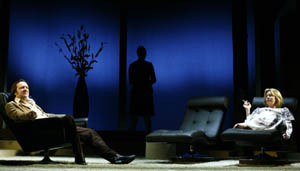March 20, 2007
Harold Pinter’s classic interrogation of the integrity of memory and its relationship with history is, intriguingly, being revisited by Peter Hall 36 years after he directed its world premiere for the RSC. Given Pinter’s assertion that “the past is what you remember, imagine you remember, convince yourself you remember, or pretend you remember”, it would be interesting to know how the current production, an undoubtedly nostalgic reminiscence from a now-established director of a now-established play, relates to his initially radical venture. The parallel themes of the narrative and its present incarnation, as the revisiting of an enthralling uncertainty that becomes ultimately accepted, offer a new dimension to the play ; how exactly should you approach a work concerned with re-experiencing the past, in what is effectively a revisitation, a generation on, to a passionate and potentially catastrophic romance?
As a director perhaps as at home with Pinter’s material as it is possible to be, Peter Hall handles the broad picture with a light touch, pacing the short piece to perfection and exploiting the script’s potential for a persistent three-way perspective even when the dialogue appears to narrow the field. It is, though, a testament to an appropriate and extremely capable cast, that they are able to hold the attention through protracted periods of silence, particularly in the case of Susannah Harker’s Kate, whose presence is so often physical but inanimate while the scene of combative and emotionally charged reflection plays out around her. Always fondly remembered for her remarkable portrayal of Mattie in the BBC adaptation of House of Cards, Ms Harker is hardly associated with passivity, but here she fully realises Pinter’s understanding of silent power, offering a dignified but potent object of attention whose cool detachment belies her fundamental dominance.
The balance of personalities is exquisite; Pinter’s dialogue, handled indelicately, is always in danger of descending into monotone, but the contrasting and complementary talents within the cast find the wit, pathos and restrained desperation required to complete the written foundations of the three characters. As a stalwart of Channel 4’s Drop The Dead Donkey, Neil Pearson slides easily into the role of the cynically objective documentary maker Deeley, whose faith in the stability of direct observation becomes increasingly challenged through the interrelated and often interchangeable narratives of Kate and Anna, whose identities are always on the brink of merging. Pinter himself has, in the past, taken on the role; it is clearly a significantly personal piece, and Hall’s choice of Pearson to portray the character is well-judged.
Everything about this production suggests a relaxed, experienced confidence, from the lighting and set designs to the performances themselves. This is an ideal opportunity to catch a pertinent and challenging interpretation of one of the core examples of postwar British drama. It is also a rare opportunity, one that may not be repeated, to capture the Hall/Pinter combination that epitomised such a vast and significant body of progressive theatre.
As a director perhaps as at home with Pinter’s material as it is possible to be, Peter Hall handles the broad picture with a light touch, pacing the short piece to perfection and exploiting the script’s potential for a persistent three-way perspective even when the dialogue appears to narrow the field. It is, though, a testament to an appropriate and extremely capable cast, that they are able to hold the attention through protracted periods of silence, particularly in the case of Susannah Harker’s Kate, whose presence is so often physical but inanimate while the scene of combative and emotionally charged reflection plays out around her. Always fondly remembered for her remarkable portrayal of Mattie in the BBC adaptation of House of Cards, Ms Harker is hardly associated with passivity, but here she fully realises Pinter’s understanding of silent power, offering a dignified but potent object of attention whose cool detachment belies her fundamental dominance.
The balance of personalities is exquisite; Pinter’s dialogue, handled indelicately, is always in danger of descending into monotone, but the contrasting and complementary talents within the cast find the wit, pathos and restrained desperation required to complete the written foundations of the three characters. As a stalwart of Channel 4’s Drop The Dead Donkey, Neil Pearson slides easily into the role of the cynically objective documentary maker Deeley, whose faith in the stability of direct observation becomes increasingly challenged through the interrelated and often interchangeable narratives of Kate and Anna, whose identities are always on the brink of merging. Pinter himself has, in the past, taken on the role; it is clearly a significantly personal piece, and Hall’s choice of Pearson to portray the character is well-judged.
Everything about this production suggests a relaxed, experienced confidence, from the lighting and set designs to the performances themselves. This is an ideal opportunity to catch a pertinent and challenging interpretation of one of the core examples of postwar British drama. It is also a rare opportunity, one that may not be repeated, to capture the Hall/Pinter combination that epitomised such a vast and significant body of progressive theatre.




